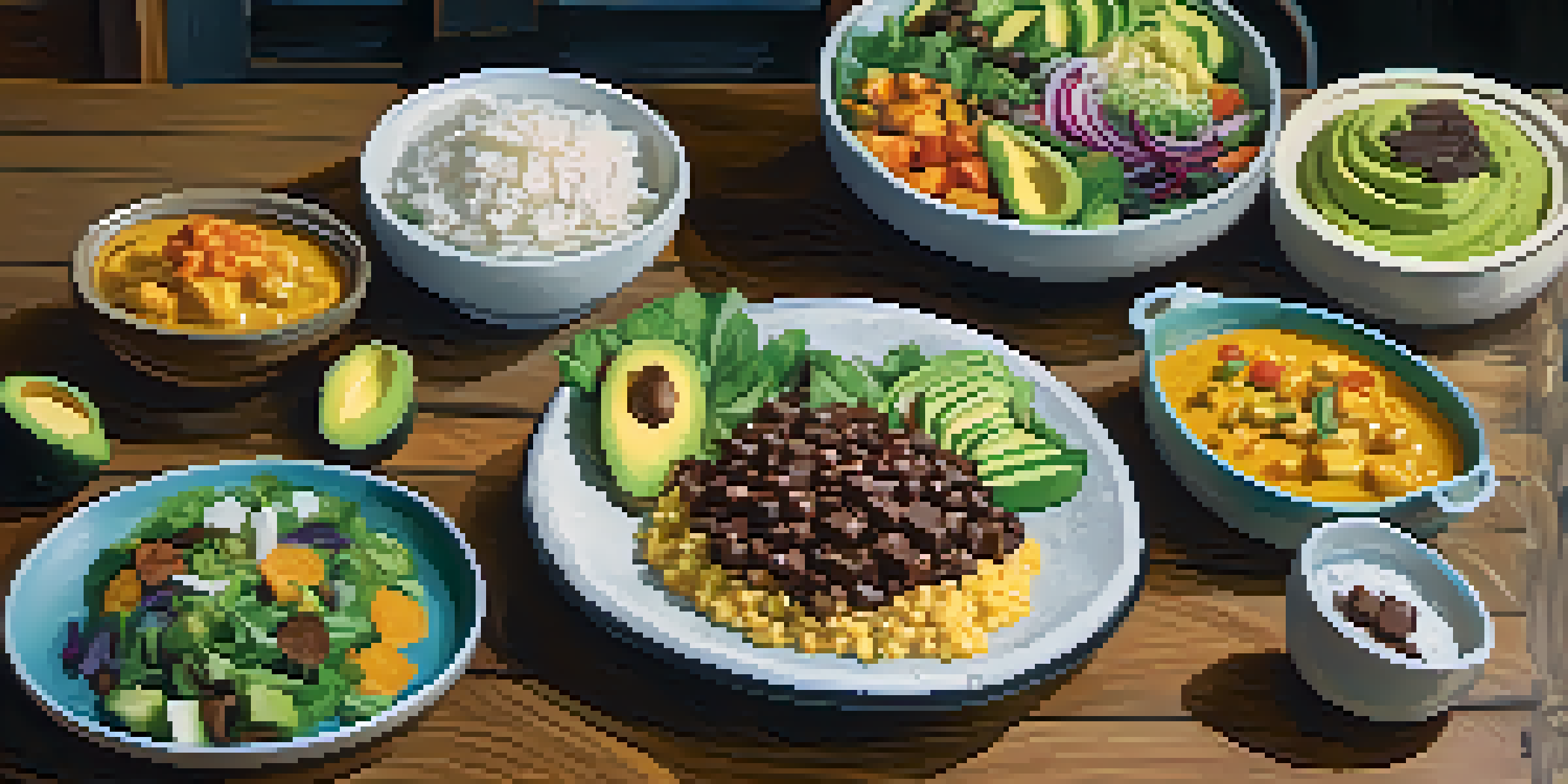Saturated Fats: Myths and Facts for Vegetarians

Understanding Saturated Fats: The Basics
Saturated fats are a type of fat found in various foods, including animal products and some plant oils. They are often solid at room temperature, which can make them easily recognizable. Common sources include butter, cheese, and fatty cuts of meat, but they can also be found in some vegetarian sources like coconut oil and palm oil.
Moderation is the key to lasting enjoyment.
The confusion surrounding saturated fats mainly stems from their reputation. For years, health experts have warned against them, linking high saturated fat intake to heart disease. However, recent research has begun to paint a more nuanced picture, encouraging a closer look at the role these fats play in our diets.
For vegetarians, understanding saturated fats is essential, especially since many plant-based options still contain them. By recognizing where these fats come from and their potential effects, vegetarians can make more informed dietary choices.
Myth 1: All Saturated Fats Are Bad for You
One of the biggest myths is that all saturated fats are harmful. While it’s true that excessive saturated fat intake can lead to health issues, not all saturated fats behave the same way in the body. Some studies suggest that certain saturated fats may not significantly impact heart health, challenging the one-size-fits-all approach to dietary fats.

For instance, the saturated fat found in coconut oil may have different effects compared to that in red meat. This highlights the importance of looking at the source of saturated fats rather than categorizing them all as bad. By focusing on whole foods and balanced diets, vegetarians can integrate healthy sources of saturated fats without fear.
Saturated Fats Aren't All Bad
Not all saturated fats negatively impact health, and some sources, like coconut oil, can be beneficial.
Understanding this myth can empower vegetarians to include moderate amounts of saturated fats from sources like dark chocolate or certain oils without guilt. It’s not about elimination, but rather about making thoughtful choices.
Myth 2: Saturated Fats Cause Weight Gain
Another common misconception is that saturated fats directly lead to weight gain. While it’s true that fats are calorie-dense, the relationship between fat intake and weight is more complex. Weight gain typically results from consuming more calories than the body burns, regardless of the fat type.
The food you eat can be either the safest and most powerful form of medicine or the slowest form of poison.
Incorporating healthy fats, including saturated ones, can actually promote satiety, helping you feel full longer. This can lead to reduced overall calorie consumption, making it easier to maintain a healthy weight. Thus, a balanced diet that includes moderate saturated fats can still be part of a weight management strategy.
It's essential for vegetarians to focus on a variety of healthy fats, like those from nuts and avocados, alongside occasional saturated fats. This balanced approach can help maintain energy levels and promote overall well-being.
The Role of Saturated Fats in a Vegetarian Diet
Saturated fats can play a role in a vegetarian diet, especially when focusing on whole food sources. Foods like coconut, dark chocolate, and even some plant-based dairy alternatives contain saturated fats that can be beneficial in moderation. These sources can contribute to the overall flavor and enjoyment of meals.
Moreover, fat is essential for absorbing fat-soluble vitamins like A, D, E, and K. Including moderate amounts of saturated fats can aid in nutrient absorption and improve overall health. This is particularly important for vegetarians, who may need to be more mindful of their vitamin intake.
Fats Aid Nutrient Absorption
Moderate intake of saturated fats is essential for absorbing fat-soluble vitamins and enhancing overall health.
Thus, rather than fearing saturated fats, vegetarians should aim for a balanced intake that includes a variety of fats. This approach not only supports nutrient absorption but also enhances meal satisfaction.
Signs You Might Need More Saturated Fats
Many vegetarians might wonder if they’re getting enough saturated fats in their diets. If you experience fatigue, frequent cravings, or difficulty concentrating, it could be a sign your body is lacking healthy fats. These symptoms can sometimes be linked to insufficient fat intake, including saturated fats.
Incorporating moderate amounts of saturated fats can help improve energy levels and overall cognitive function. For example, adding coconut oil to smoothies or using grass-fed butter in cooking can be simple ways to boost your intake. Listening to your body and responding with balanced dietary choices is key.
Remember, though, that moderation is crucial. Focus on integrating diverse fat sources to ensure you’re meeting your nutritional needs while enjoying a range of flavors in your vegetarian meals.
How to Incorporate Healthy Saturated Fats
Incorporating healthy saturated fats into your vegetarian diet can be simple and delicious. Start by choosing whole food sources like coconut milk, dark chocolate, and certain nut butters. These options can easily be added to smoothies, baked goods, or savory dishes for added flavor and nutrition.
Experimenting with different cooking oils, such as coconut or palm oil, can also introduce variety into your meals. Using these oils for sautéing vegetables or as a base for dressings can enhance both taste and health benefits. Just remember to use them in moderation to maintain balance.
Balance is Key in Diet Choices
Incorporating healthy saturated fats in moderation allows for a satisfying and nutritious vegetarian diet.
Additionally, don’t shy away from enjoying the occasional treat. Indulging in a piece of dark chocolate or a coconut-based dessert can provide pleasure while still fitting into a healthy diet. Finding harmony between enjoyment and nutrition is key.
Final Thoughts: Embracing Moderation and Balance
Ultimately, the key takeaway is that saturated fats are not inherently bad; it’s all about how we incorporate them into our diets. Moderation and balance are essential. By understanding the nuances of saturated fats, vegetarians can make informed choices that support their health without feeling deprived.
Being mindful of the sources of saturated fats and prioritizing whole foods can lead to a more enjoyable and nutritious vegetarian lifestyle. Embracing a balanced approach allows for a diverse range of flavors and nutrients, ensuring you’re meeting your dietary needs.

So, the next time you hear someone say that saturated fats are the enemy, remember that knowledge is power. With the right information, you can navigate your vegetarian diet with confidence and satisfaction.